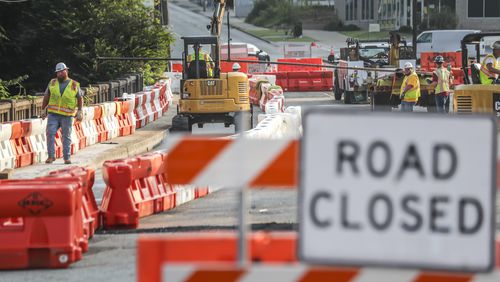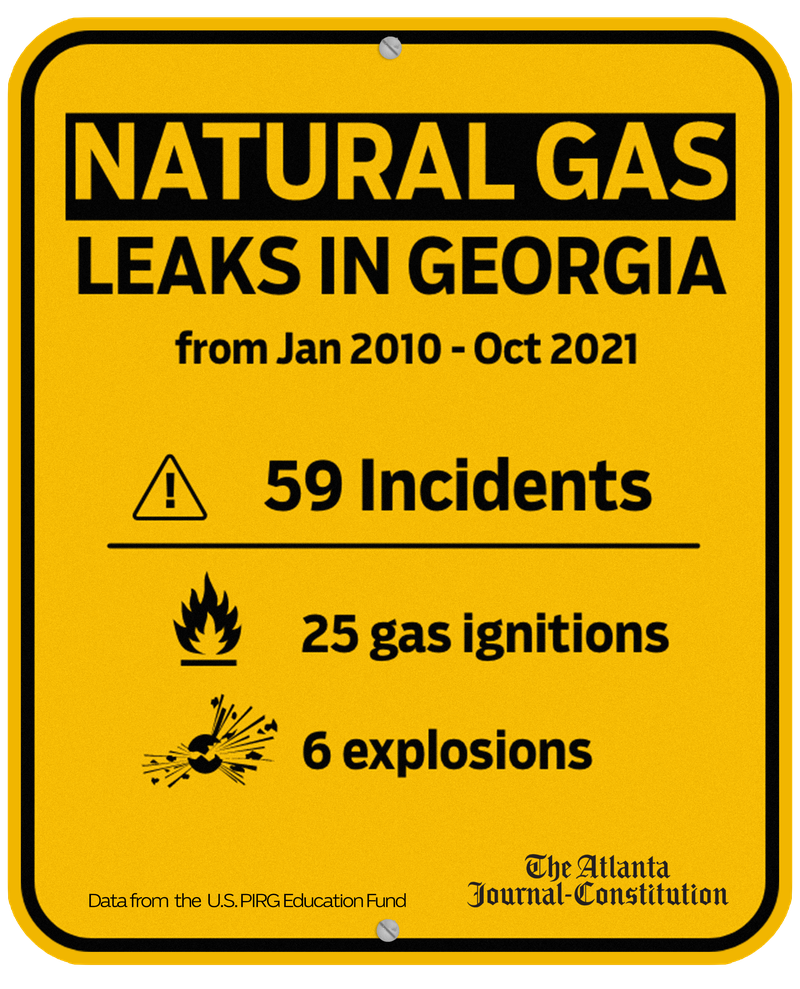Few states see more natural gas leaks from pipelines than Georgia does, according to a new analysis of federal incident data, leading to millions of dollars in damages and at least two deaths here since 2010.
Georgia had 59 reported pipeline leaks from 2010 to October of last year — the 10th most of any state — according to a recent report by Environment America, U.S. Public Interest Research Group Education Fund (U.S. PIRG) and Frontier Group. Of those, 25 caused fires and six triggered explosions.
In addition to the fatalities, at least nine people were injured in those incidents, data from the report shows.
The natural gas leaks included in the report were those that caused injuries, deaths or extensive property damage, which are required to be reported to the federal government. Leaks in Georgia resulted in more than $30 million in gas losses, repairs and property damage during the time frame, according to the news release.
Leaks present the most visible examples of the dangers of natural gas. Last August, a fire hit a pipeline underneath a bridge along Cheshire Bridge Road in Atlanta, and the bridge was compromised. Businesses along the street still feel the weight of the bridge’s closure.
Mercado Acapulco y Taqueria, a Mexican grocery store and restaurant, has lost 30% in sales since the bridge closed, owner Jonas Ghebre said. He said customers have placed orders on the phone but never picked them up because of the road closure.
“The bridge has been the closest way to get to my store,” Ghebre said. “Now they have to go all the way through Piedmont (Road) or some other way, which takes time from their lunch hours.”
Credit: Sam Baskin
Credit: Sam Baskin
The estimated related cost of the Cheshire Bridge Road incident — from property damage, the emergency response and lost gas — is more than $10.3 million, according to an incident report.
The gas leaks report found there were almost 2,600 reported leaks nationally, and 368 of those caused explosions from 2010 to October 2021. Nationally, leaks cost $4 billion, the report said.
Despite ranking in the top 10, the number of leaks in Georgia was modest compared to those in other states. Texas, for instance, reported 287, followed by California with 229 since 2010.
Matthew Casale, U.S. PIRG’s environment campaigns director, said gas leak dangers aren’t limited to just a few states. The leaks caused 122 fatalities and 603 injuries across the nation since 2010, according to the report. Casale said investments in the gas system should prioritize the most dangerous leaks, but that ultimately, society should move away from gas.
Though it is a fossil fuel, natural gas is often marketed as a “cleaner” alternative to coal. And while burning it produces less heat-trapping carbon dioxide than coal combustion, natural gas is mostly comprised of methane, another potent greenhouse gas capable of trapping roughly 25 times more heat over its lifespan than carbon dioxide, according to the federal Environmental Protection Agency.
“We can have an energy system where we power our homes on clean electricity,” Casale said. “It’s not going to happen overnight … But we can and should start doing the things that start to move us more quickly in that direction.”
Nearly half of Georgia’s electricity in 2020, however, was generated by burning natural gas, according to the U.S. Energy Information Administration. Nuclear power produced 27% and 12% came from renewables, like solar. Coal-fired plants also accounted for 12% of the state’s electricity supply generated in 2020, according to the EIA.
The state’s largest utility, Georgia Power, is seeking approval from the Georgia Public Service Commission (PSC) for a plan that would phase out most of the company’s coal plants while expanding its reliance on natural gas and solar. Groups behind the report urged the utility and the PSC to move away from gas.
In a statement, Georgia Power said needs a balanced energy mix and natural gas is important to its power generation plans.
“As our state continues to grow and the energy landscape rapidly evolves, we recognize and respect our customers’ focus on the reliability and resiliency of Georgia’s electric system, the expansion of our clean energy resources and Georgia Power’s continued ability to safely and reliably meet their energy needs,” Kelly Richardson, Georgia Power spokeswoman, said in a statement.
A study published in 2019 estimated that a transition to all-renewable energy sources could cost $7.8 trillion in the United States, but that ensuing electricity and heat sales would pay for that cost. In contrast, a Deloitte report published in January found that “insufficient action” on climate change would cost the U.S. economy $14.5 trillion over the next 50 years.
The report on natural gas leaks comes months after the Biden administration announced in January new parts to its plan to reduce methane emissions. A new federal rule announced in March requires remote-controlled or automatic shutoff valves to be installed on new or replaced onshore hazardous liquid pipelines, including those for natural gas, according to a news release.
The U.S. Department of Transportation began accepting applications in May for a grant program to replace high-risk, leak-prone natural gas distribution infrastructure, according to a news release. The program, created with the passage of the Bipartisan Infrastructure Law in November 2021, will provide $200 million annually for five years.
BY THE NUMBERS
59
Pipeline leaks from 2010 to October 2021 in Georgia reported to the federal government that caused injuries, deaths or extensive property damage.
+$30 million
The estimated value of gas losses, property damage and repairs from gas leaks.
9
People injured by major gas pipeline leak incidents from 2010 to 2021.
2
Deaths caused by gas pipeline leaks in Georgia in that time.
Sources: Report by Environment America, U.S. Public Interest Research Group Education Fund (U.S. PIRG) and Frontier Group.
Editor’s note: This story has been updated to correct the spelling of Jonas Ghebre’s last name.
About the Author








